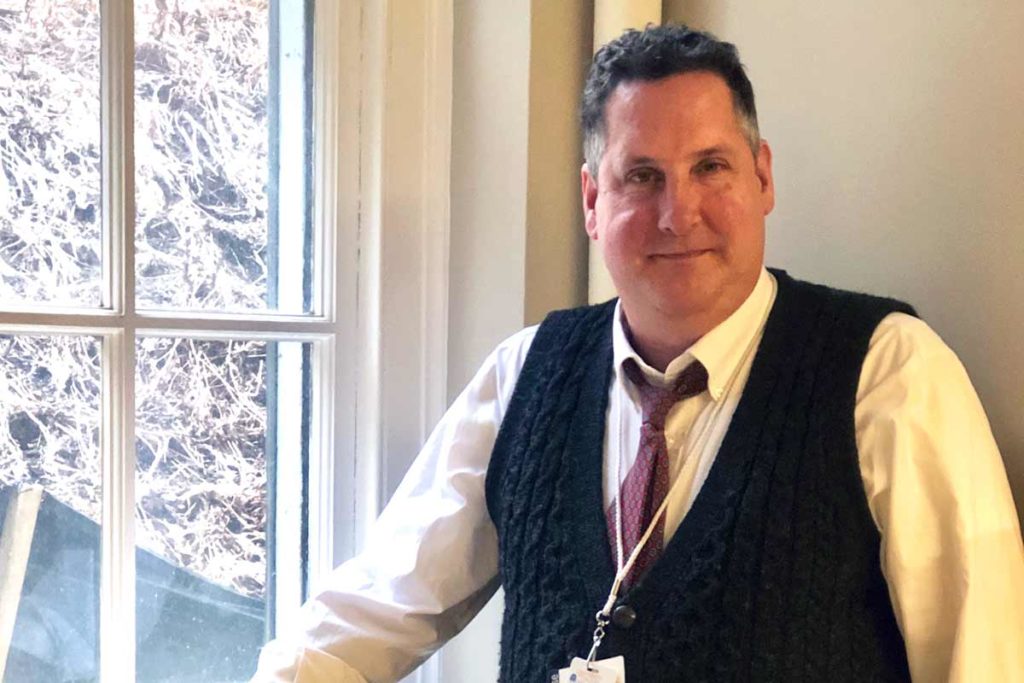Jonathan Bartels, RN, contributed this post. He’s a UVA palliative care nurse and part of the School of Nursing’s Compassionate Care Initiative. He had colon cancer surgery last year.
The first time I was concerned about my health was when I had to run to catch the city bus. I am not in the best shape (after recovering from 2 broken feet last year!), but a little jog should not make me so short of breath that I was gasping. But that’s what happened. As any fine 50-year-old man does, I ignored that little episode.
A few months later I decided to walk to work from home. I used to do that walk everyday a few years ago, and it is literally uphill both ways. As I tried to walk briskly up the first hill, I started to feel lightheaded and dizzy. My breathing and effort to breathe steadily increased, as if I was walking at some high Himalayan elevation.
By the time I reached the top of the hill, I felt like I was going to pass out. I bent over like you see with marathon runners and stood up spreading my arms to catch my breath. I then proceeded to work at a much more controlled pace. At that point I realized that I was indeed in poor physical shape, but there was something else going on.
Lynch Syndrome and my Colon Cancer Family History
I made an appointment and saw my primary care doctor here at UVA, who is also a friend. On my “Reason to see Physician Today” question, I jokingly answered, “I’m dying; tell me why.”
My doctor did a thorough workup — labs, X-ray, physical. Most of the results came back normal, except my oxygen-carrying hemoglobin was low. I had more tests and fewer answers. We finally decided to get a scope and see if I had an upper gastrointestinal (GI) bleed.
At that point, I decided to ask for a colonoscopy. I have an extensive family history of colon cancer. I recalled that my sister did a new gene analysis 20 years ago and was found to have a colon cancer gene (Lynch syndrome).
She warned me and my other five siblings that we should be vigilant in regards to colon cancer. I got a colonoscopy at 31 just to abate my family’s fears. I was clean so my male logic reared its wisdom. I ignored the recommendations for further frequent scopes. Now I was going to check.
A few weeks later I went into the endoscopy suite, still confident the source of my bleeding was something minor. We all know denial is not just a river in Egypt. After I woke up post anesthesia, the GI fellow informed me that I did in fact have cancer.
It was like someone had torn the rug out from beneath my feet. I had no ground to stand on and no place to hold. As an expert in palliative care, helping people cope with serious illnesses, my mind raced into the scenarios I see daily. I was going to die.
Colon Cancer Surgery: Removing My “Tumor Baby”
I was blessed that one of my favorite GI surgeons looked at my scope and tumor. I also called on an oncologist friend at UVA to be my cancer doctor if I needed further treatment.
After the biopsy confirmed my diagnosis and all the scans were complete, my surgeon told me that I had a 6-cm tumor. It was stage 2 colon cancer, identified as Lynch syndrome. The clinic called and let me know I was set up for surgery to remove what I now fondly referred to as my “tumor baby.”
Concerned About Your Colon Cancer Risk?
Talk to your primary care provider about your colorectal cancer screening options.
The day of surgery I was blessed to have not one, but two chaplains, a Christian and a Muslim, offer me, a Buddhist, prayer. I entered the surgical suit and introduced myself and thanked all there. Just prior to the surgery, they honored my request and performed a Pause to honor the covenant I had with them and my surgeon.
Eight hours later, my ‘tumor baby’ and 70% of my colon were gone. The surgeon took much of my colon to minimize my risk of getting cancer again. This led to a lengthy period of adjustment and recovery.
Free From Stage 2 Colon Cancer
Now, many months later, I am cancer-free. My gut has started to adjust and re-acclimate to its new functional status. I’ll follow up yearly with colonoscopies for the next few years. Eventually, I’ll be able to wait 2-3 years. It is all worth it to make sure I will not be caught unaware again.
Two of my four children are now aware that they also have this cancer gene. And I will be alive for much longer than I would have if I had not listened to my body.
So I encourage anyone who will listen — get checked. If you have a family history, be more vigilant. If you have symptoms that cannot easily be explained, see your doctor. My shortness of breath saved my life.
